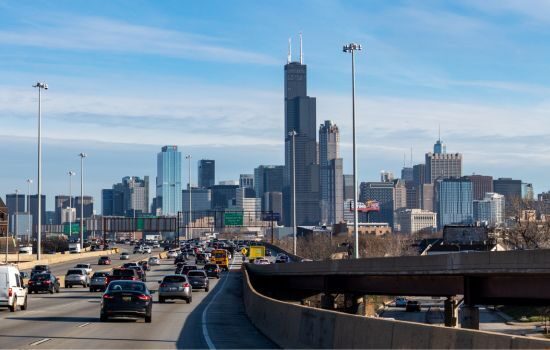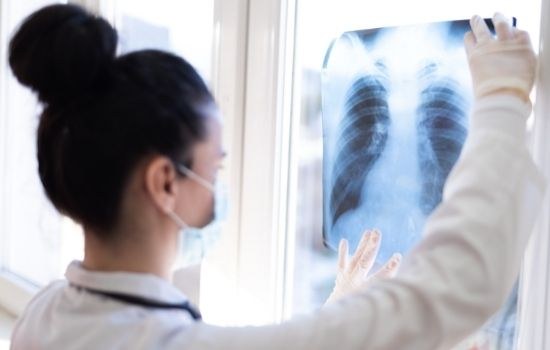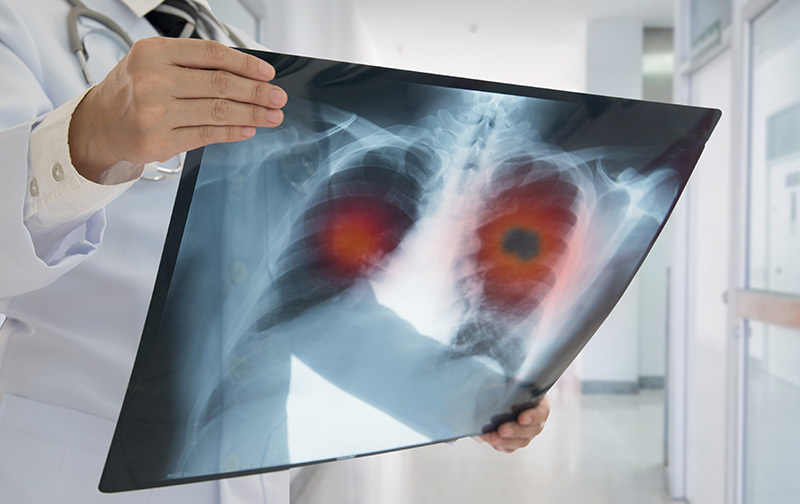Important Traffic Notice: Due to road construction on Southwest Highway directly in front of our Chicago Ridge location, traffic may be heavier than usual. Please plan ahead and allow extra time to arrive safely. Thank you for your patience and understanding!
February 10, 2025
5 Causes of Lung Cancer That Non-Smokers Should Be Aware Of

You might be surprised to learn that smokers aren't the only ones at risk of developing lung cancer. While tobacco use is the number one risk factor, there are other known causes of lung cancer that put non-smokers at risk of developing it too. Let’s look at some of these and what you can do to lower your risk, other than to stop smoking.
1. Secondhand Smoke
Cigarette smoke is harmful, even if you don't smoke. Spending time near others who smoke increases your personal risk. It’s important to limit your exposure to secondhand smoke as much as possible. Living with a smoker increases your chances of developing lung cancer by 30%! Whether you inhale the smoke indirectly or regularly come into contact with clothing, upholstery, bedding, and other household items contaminated with cigarette smoke residue, the effect is the same.
Consider discussing the issue with your partner or roommate and encourage them to quit smoking, or at least to smoke outdoors rather than indoors. When you are with others who smoke, try to meet outdoors to minimize exposure.

2. Air Pollution
Exposure to high levels of air pollution over the course of years increases the risk of developing lung cancer. The chemicals in the pollution cause DNA damage, which can lead to tumor growth. The longer you are exposed to high pollution levels, the greater your risk becomes.
Living in urban areas like Chicago can present challenges when trying to monitor how much pollution you breathe in due to frequent poor air quality days. Try to take some time outdoors away from the city whenever possible to get a breath of fresh air!
3. Genetic Mutations Related to Lung Cancer
Our genes can change over time based on exposure to chemicals and other environmental factors, including exposure to smoke and other pollutants. Genetic changes that occur during a person's lifetime are called somatic mutations. A mutation of several genes including the TP53, EGFR, and KRAS genes, are known to be related to the development of non-small cell lung cancer. Most people aren’t aware of these genetic mutations and there is no lung cancer screening recommendation for people who don’t smoke.
However, a family history of lung cancer can influence your doctor’s decision to monitor you closely, especially if the diagnosed family member did not smoke. Take time to discuss your family medical history with your doctor, especially if you are experiencing symptoms associated with lung cancer.
4. Radon Exposure
Radon is a colorless and odorless radioactive gas produced from the decay of uranium deposits. It can enter buildings and homes and become trapped in the air we breathe. Long-term radon exposure can lead to serious health issues, including an increased risk of lung cancer, particularly for non-smokers.
The only way to know if radon is present in your home is to conduct a test. According to the Illinois Emergency Management Agency and Office of Homeland Security, elevated radon levels have been found in homes across the state, and all homes should be tested regardless of their location. Illinois residents can check their home's radon levels using a testing kit or by hiring a qualified radon mitigator.
5. Cancer-Causing Substances
Prolonged exposure to cancer-causing agents, known as carcinogens, can increase your risk of developing lung cancer. Benzene and asbestos are two specific carcinogens associated with cell mutation in the lungs. These substances can remain in the body for some time after exposure, essentially building up over your lifetime.
Try to avoid long-term exposure to exhaust fumes. This is easier said than done when living in the Chicago area. If you work with cars, try to step away from the exhaust for fresh air, or turn the cars off while idling, to lower your exposure to benzene.
If you work in construction, the auto industry or in HVAC you may have some exposure to asbestos. Always wear protective masks and clothing to keep this substance out of your lungs.
Is Vaping Smoke Cause for Concern?
While there is currently insufficient evidence to prove that vaping causes cancer definitively, it is wise to exercise caution. Vaping involves heating a substance and inhaling it, similar to smoking. The liquid used in e-cigarettes is oil-based and contains a mixture of nicotine and other chemicals, which can coat the inside of the lungs when vaporized. To reduce your risk, it is best to limit your exposure to vape smoke just as you would with tobacco smoke.
Who Can Be Screened for Lung Cancer?
Lung cancer screening has become more widely available over the past decade, allowing for earlier detection and diagnosis of lung cancer when it is more treatable. However, it is usually offered only to individuals with a history of smoking.

If you think you might be at high risk for developing lung cancer due to any relevant factors, consult your doctor. They may recommend additional diagnostic tests to examine your lungs for potential issues.
Lung Cancer Symptoms Among Non-Smokers
As a non-smoker, it’s important to be aware of the symptoms associated with lung cancer, such as coughing and difficulty breathing. While these symptoms may be related to other conditions, they could also indicate lung cancer or pulmonary fibrosis—a condition characterized by scar tissue formation in and around the lungs.
If you experience persistent coughing or difficulty breathing without other conditions like fever or congestion, schedule an appointment with your doctor if these issues do not improve within a few weeks. You may be referred to a lung specialist called a pulmonologist, who can thoroughly evaluate your condition through tests such as a CT scan, chest X-ray, and lab tests.

Lung Cancer Care in South Chicago
If you are diagnosed with lung cancer, the specialists at Affiliated Oncologists are here to create a treatment plan and provide assistance during your cancer journey. Our lung cancer doctors are located in the South Chicago area, serving Chicago Ridge, Hazel Crest, Mokena, and Orland Park, Illinois.
Categories: Lung Cancer